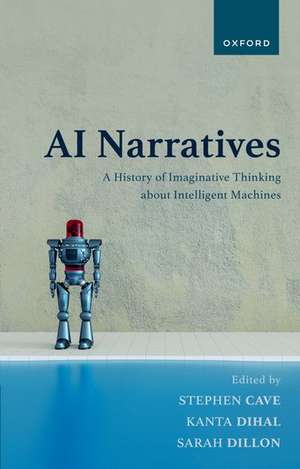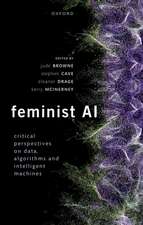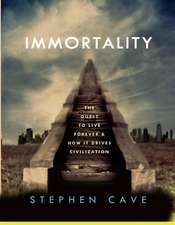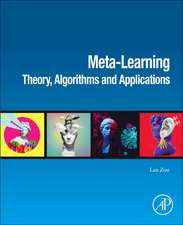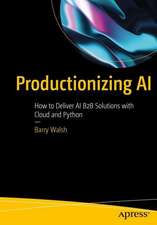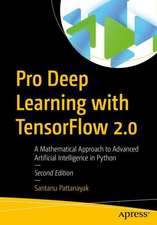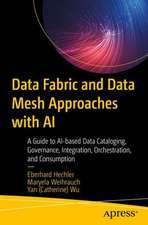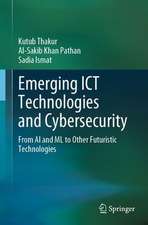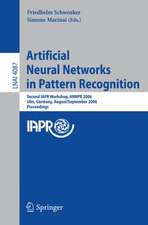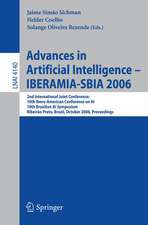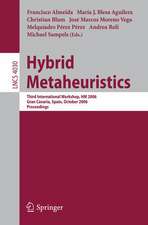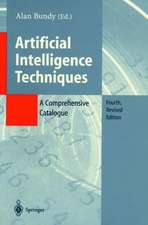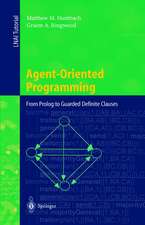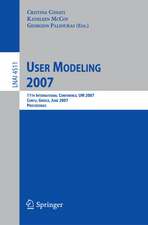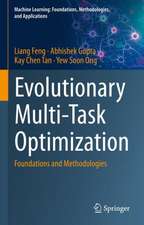AI Narratives: A History of Imaginative Thinking about Intelligent Machines
Editat de Stephen Cave, Kanta Dihal, Sarah Dillonen Limba Engleză Paperback – 20 mai 2024
| Toate formatele și edițiile | Preț | Express |
|---|---|---|
| Paperback (1) | 213.09 lei 10-16 zile | |
| OUP OXFORD – 20 mai 2024 | 213.09 lei 10-16 zile | |
| Hardback (1) | 524.71 lei 10-16 zile | |
| OUP OXFORD – 5 mar 2020 | 524.71 lei 10-16 zile |
Preț: 213.09 lei
Preț vechi: 312.43 lei
-32% Nou
Puncte Express: 320
Preț estimativ în valută:
40.78€ • 42.42$ • 33.67£
40.78€ • 42.42$ • 33.67£
Carte disponibilă
Livrare economică 13-19 martie
Preluare comenzi: 021 569.72.76
Specificații
ISBN-13: 9780198914709
ISBN-10: 0198914709
Pagini: 448
Dimensiuni: 136 x 215 x 20 mm
Greutate: 0.61 kg
Editura: OUP OXFORD
Colecția OUP Oxford
Locul publicării:Oxford, United Kingdom
ISBN-10: 0198914709
Pagini: 448
Dimensiuni: 136 x 215 x 20 mm
Greutate: 0.61 kg
Editura: OUP OXFORD
Colecția OUP Oxford
Locul publicării:Oxford, United Kingdom
Recenzii
A path-breaking book that surveys the important place of narrative in the long history of the interaction between humans and intelligent machines. All of the chapters are well researched, well argued, and informative, whether they recount a recent book by the author or present new research ... These virtues make AI Narratives a path-breaking book that surveys the important place of narrative in the long history of the interaction between humans and intelligent machines in Europe and the United States.
Readers will find in this volume a rewarding trove of narrative analyses that inform contemporary thinking about the social and political consequences of AI and prompt further historical investigation.
The editors have organized wide-ranging historical and critical materials into an admirably coherent set of chapters that focus on our age-old interests in myths, legends, and stories about artificial life, especially when it looks like us ... AI Narratives is consistently interesting and critically significant.
... a milestone book, ... sure to become required reading for any undergraduate course on the intersection of technology and the humanities, ....
... consistently interesting and critically significant.
Drawing on diverse perspectives, this compelling collection shows how AI narratives have prompted critical reflection on human-machine relations, moving beyond the reductive dichotomy that pits visions of happy humans with AI-slaves against visions of defeated humans ruled by machines. By invoking such concepts as equality, rights and social justice, the essays investigate what it means to be human in an increasingly automated world.
The collection's focus on the history of imaginative thinking about intelligent machines, as well as the importance of narrative itself, offers a study that has been lacking in Al criticism. By including both literal and figurative representations of machine intelligence, the collection identifies the role of sf in the interplay between fiction and non-fiction, but brings to the fore the importance of non-sf through the exploration of narratives that intersect with understandings of Al, and engage with concepts that underpin societal understandings of machines, humans and their continued, growing coexistence.
a powerful account of AI imaginaries
AI Narratives triumphantly paves the way for future work in AI humanities. Individual chapters—all balancing historical context with sharp analysis—would make valuable additions to relevant module syllabi, and the volume would be of certain advantage to any reader seeking a fresh and substantiated approach to AI scholarship. This is only a first glance into this kaleidoscopic field of study, but it positions future researchers well for imaginative thinking about their own perceptions.
Readers will find in this volume a rewarding trove of narrative analyses that inform contemporary thinking about the social and political consequences of AI and prompt further historical investigation.
The editors have organized wide-ranging historical and critical materials into an admirably coherent set of chapters that focus on our age-old interests in myths, legends, and stories about artificial life, especially when it looks like us ... AI Narratives is consistently interesting and critically significant.
... a milestone book, ... sure to become required reading for any undergraduate course on the intersection of technology and the humanities, ....
... consistently interesting and critically significant.
Drawing on diverse perspectives, this compelling collection shows how AI narratives have prompted critical reflection on human-machine relations, moving beyond the reductive dichotomy that pits visions of happy humans with AI-slaves against visions of defeated humans ruled by machines. By invoking such concepts as equality, rights and social justice, the essays investigate what it means to be human in an increasingly automated world.
The collection's focus on the history of imaginative thinking about intelligent machines, as well as the importance of narrative itself, offers a study that has been lacking in Al criticism. By including both literal and figurative representations of machine intelligence, the collection identifies the role of sf in the interplay between fiction and non-fiction, but brings to the fore the importance of non-sf through the exploration of narratives that intersect with understandings of Al, and engage with concepts that underpin societal understandings of machines, humans and their continued, growing coexistence.
a powerful account of AI imaginaries
AI Narratives triumphantly paves the way for future work in AI humanities. Individual chapters—all balancing historical context with sharp analysis—would make valuable additions to relevant module syllabi, and the volume would be of certain advantage to any reader seeking a fresh and substantiated approach to AI scholarship. This is only a first glance into this kaleidoscopic field of study, but it positions future researchers well for imaginative thinking about their own perceptions.
Notă biografică
Stephen CaveDr Stephen Cave is Director of the Leverhulme Centre for the Future of Intelligence, Senior Research Associate in the Faculty of Philosophy, and Fellow of Hughes Hall, all at the University of Cambridge. After earning a PhD in philosophy from Cambridge, he joined the British Foreign Office, where he spent ten years as a policy advisor and diplomat, before returning to academia. His research interests currently focus on the nature, portrayal and governance of AI.Kanta DihalDr Kanta Dihal is a postdoctoral researcher at the Leverhulme Centre for the Future of Intelligence, University of Cambridge. She is the Principal Investigator on the Global AI Narratives project, and the Project Development Lead on Decolonizing AI. In her research, she explores how fictional and nonfictional stories shape the development and public understanding of artificial intelligence. Kanta's work intersects the fields of science communication, literature and science, and science fiction. She is currently working on two monographs: Stories in Superposition, based on her DPhil thesis, and AI: A Mythology, with Stephen Cave.Sarah DillonProfessor Sarah Dillon is University Lecturer in Literature and Film in the Faculty of English, University of Cambridge. Her books include The Palimpsest: Literature, Criticism, Theory (2007), Deconstruction, Feminism, Film (2018), and Listen: Narrative Evidence and Public Reasoning (2020, co-authored with Claire Craig). She is the General Editor of the series Gylphi Contemporary Writers: Critical Essays, and editor of two volumes in the series: David Mitchell: Critical Essays (2011), and Maggie Gee: Critical Essays (2015, co-ed). Dr Dillon was a 2013 BBC Radio 3/Arts and Humanities Research Council New Generation Thinker and regularly broadcasts on BBC Radio 3 and BBC Radio 4.
